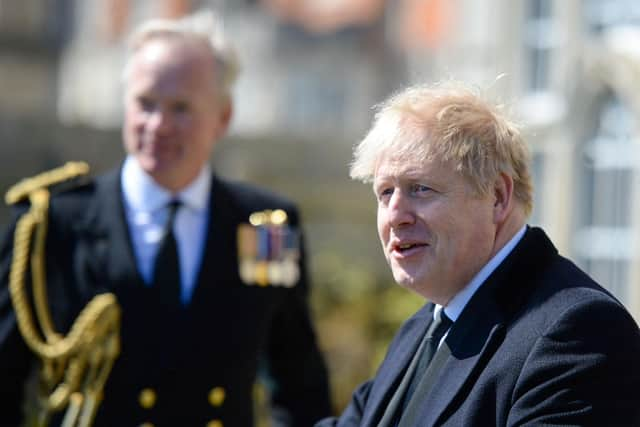UK Government declines to commit to Covid inquiry timeline as Nicola Sturgeon calls for four-nations commitment
The First Minister explained she has already committed to an inquiry covering Scotland in 2021, but insisted a UK-wide inquiry could also look at issues affecting each nation.
The Prime Minister has previously said he supported holding an inquiry into the UK’s response to Covid-19 after being challenged to commit to one by the Liberal Democrat leader Ed Davey.
Despite this, a timescale has not yet been set.
Advertisement
Hide AdAdvertisement
Hide Ad

Ms Sturgeon said: “I am committed to establishing in Scotland a judge-led public inquiry to examine all aspects of our handling of the pandemic – including the situation in our care homes – and to have this under way before the end of this year.
“This will happen in Scotland, whether or not it happens in other parts of the UK.
“However, there is no doubt it would be beneficial to have an inquiry that could look across the four nations as well as at specific issues within each nation – this would help provide answers to families, businesses and all those who have made sacrifices over the last year.
“I hope all governments across the UK will join me in committing to a full public inquiry starting later this year.”
The SNP’s election manifesto calls for a “person-centred” public inquiry that would hear from those who have lost loved ones to the virus.
Responding to her comments, a UK Government spokesperson declined to set a date.
The spokesperson said: “The UK Government is focused on tackling the virus and successful rollout of the vaccine.
“We will continue to work closely with devolved administrations to defeat the pandemic.
Advertisement
Hide AdAdvertisement
Hide Ad“As we previously said, there will be an appropriate time in the future to look back, analyse and reflect on all aspects of this global pandemic.”
The position from the First Minister came on a day Ms Sturgeon also admitted the Scottish Government made a "mistake" when elderly people were discharged from hospital to care homes in the early stages of the pandemic.
More than 1,300 elderly people were sent to care homes before a robust and safe testing regime was in place.
SNP health secretary Jeane Freeman had earlier admitted the policy had been a “mistake”.
Asked whether she agreed Ms Sturgeon replied: “With the benefit of hindsight, yes.”
Explaining more on Twitter, she wrote: “What I said is that with the benefit of knowledge we have now (but did not have then), it was a mistake.
“But too many people in care homes died and we must be candid about that.
“I hope the other UK governments will join me in committing to a full public inquiry starting later this year.”
Advertisement
Hide AdAdvertisement
Hide AdScottish Liberal Democrat leader Willie Rennie claimed the admission did not “absolve her of responsibility”.
He said: “When I hear this admission from Nicola Sturgeon I think of the thousands of families who have been torn apart by the deaths of loved ones in care homes.
"Instead of admitting mistakes now, the First Minister should have heeded the warnings last year when I repeatedly urged her to test before admission to care homes.”
Scottish Labour's deputy leader and health spokesperson Jackie Baillie said: "These admissions will offer no comfort to the families of those who needlessly lost loved ones due to the Scottish Government’s errors.
“Lessons that could have been learned were ignored.”
The row comes as the leading doctors warned politicians may be “raising unrealistic public expectations” about the amount of work the NHS in Scotland can do after the coronavirus pandemic.
Dr Lewis Morrison, the chair of the British Medical Association (BMA) Scotland, spoke out along with Dr Miles Mack, the chair of the Academy of Medical Royal Colleges and Faculties in Scotland, also known as the Scottish Academy.
In a joint statement, they said: “There is real concern that political parties are raising unrealistic public expectations of the potential activity of NHS in Scotland in the run-up to the Holyrood election, without establishing how to create the capacity to deliver on these promises, especially in the timescales being talked about.”
The medical experts explained they both fully supported “the need to urgently address the healthcare needs of patients”, but insisted “this needs to be supported by an increase in capacity and workforce”.
Advertisement
Hide AdAdvertisement
Hide AdThey added: “And we cannot ignore the health and wellbeing of NHS staff who are already under severe pressure due to Covid-19 and suffering the physical and mental impact that this has had.
“In the final weeks of campaigning and when the new Scottish Government is formed, communication with the public must be realistic, and the delivery of services must be balanced with our current capacity and developed in association with NHS Scotland, the BMA, the Scottish Academy and Royal Colleges and other organisations in a position to advise on what is achievable.”
Yesterdaydaily figures revealed Scotland has recorded a further 211 cases of coronavirus, while more than 33,000 vaccination doses have been administered.
There were no new deaths reported as being linked to the virus – although registry offices are generally closed at the weekend.
Figures published on Sunday showed that 1.6 per cent of tests for Covid-19 came back as positive.
A total of 2,744,231 people have received the first dose of the coronavirus vaccine – an increase of 10,844 on the previous day.
A further 738,420 people have received their second dose, a rise of 22,706 on Saturday’s total.
If you haven't already, please consider supporting our trusted, fact-checked journalism by taking out a digital subscription.
Comments
Want to join the conversation? Please or to comment on this article.